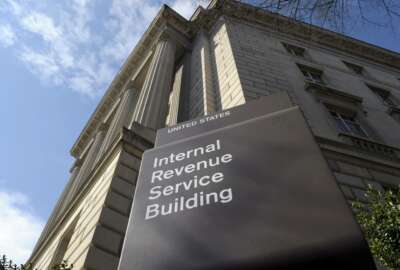 Exclusive
Exclusive IRS CIO Sieger moving to new role in Treasury
Nancy Sieger has been the IRS chief information officer in a permanent or acting basis since 2019 and helped oversee the tax agency’s pandemic IT modernization...
Nancy Sieger, the chief information officer at the IRS, is heading to main Treasury headquarters.
Federal News Network has confirmed Sieger will be Treasury’s new chief technology officer. Her last day at the IRS is March 17.

Jeffrey King, the deputy CIO at Treasury, will come over to be the acting CIO at IRS, Federal News Network also has learned.
Sieger has been CIO at the IRS for more than two years and was acting CIO since June 2019. She is a long-time IRS technology executive, having worked as the deputy CIO for filing season and tax reform, and as acting deputy CIO for operations and the associate CIO for applications development.
“My career at the IRS spans 43 years and includes not one moment of regret. At various times, I have been a mentor, a boss, a colleague, a friend, a coach… Like many people say when they depart the IRS, the hardest thing about leaving is saying goodbye to the people. You are what makes this place run, and I am incredibly proud of what we accomplished together for the country,” Sieger wrote in an email to staff, which Federal News Network obtained. “It has been the honor of a lifetime to serve as your chief information officer. Stay focused on the IRS mission and keep doing what you do best. I have complete confidence that the IRS will continue to be successful because of the professionalism and dedication of IRS IT.”
King has been deputy CIO at Treasury since September, and before that worked both in the private sector and with Treasury for six years as a senior advisor for cybersecurity.
During her tenure as CIO, Sieger led the effort to accelerate technology for employees and to taxpayers, including overseeing the agency’s work to implement the Tax Cuts and Jobs Act of 2017, which the IRS says was one of the most significant tax reform laws in over 30 years.
Additionally, she led the IRS’s technology efforts to distribute Economic Impact Payments to Americans during the COVID-19 crisis, while also upgrading the agency’s infrastructure to accommodate the agency’s transition to remote work.
Sieger also led the development of the IRS IT strategic plan and the IRS IT workforce strategy, which prioritizes training, career planning, diversity and inclusion. The IRS says employee engagement and job satisfaction scores have increased each year she was CIO.
The agency, in its 2022 IT Annual Key Insights Report, found that even with “limited funding,” the IRS delivered more than 80 new capabilities and enhancements in the first three years of its Integrated Modernization Business Plan. The IRS said these upgrades improved the efficiency and security of its IT infrastructure.
As for King, he comes into the new acting role a month before tax filing deadline. His plate will be full as the IRS continues to push forward on IT modernization efforts. Congress has been generous with funding for the IRS over the last few years.
The tax agency received more than $1.4 billion in the American Rescue Plan Act, which Congress issued to ensure “integrated, modernized and secure IRS systems.” The 2023 omnibus spending bill directs the IRS use unobligated funds from the American Rescue Plan to modernize its Customer Account Data Engine 2 and Enterprise Case Management System, as well as update web applications, taxpayer assistance systems, cybersecurity and data protection.
This is on top of the $4.75 billion it already received for its IT modernization initiative in the Inflation Reduction Act in August 2022.
Copyright © 2025 Federal News Network. All rights reserved. This website is not intended for users located within the European Economic Area.
Jason Miller is executive editor of Federal News Network and directs news coverage on the people, policy and programs of the federal government.
Follow @jmillerWFED
Related Stories





